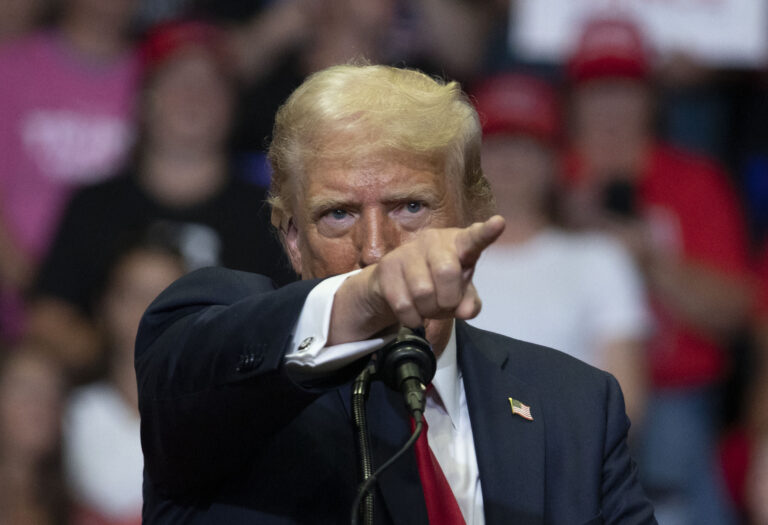Republican presidential candidate and former President Donald J. Trump held a campaign rally at Van Andel Arena in Grand Rapids, Michigan on July 20, 2024.
Bill Priano | Getty Images News | Getty Images
“A Trump victory would likely intensify trade and economic hostility between the United States and China and accelerate trade and financial decoupling between the two countries,” said Eswar Prasad, a professor of economics at Cornell University.
After Biden dropped out of the race and endorsed Vice President Kamala Harris, who is widely expected to face Trump, Prasad and other experts said Harris’ approach to China would likely be similar to Biden’s.
While both Trump and Biden have protectionist positions, their strategies and tactics are very different, explained Prasad, who was the former head of China and financial studies at the International Monetary Fund.
“Trump relied on tariffs to keep out Chinese imports. Biden would maintain those tariffs and even increase tariffs on certain imports, while focusing on restricting Chinese technology transfers and access to computer chips,” he said.
Perhaps Trump’s biggest departure from Biden’s trade policy will be the tariffs he will impose on China.
Trump, a self-described “tariff czar,” sparked a trade war with Beijing during his first term, imposing a series of tariffs on $250 billion in Chinese imports, ignoring warnings that the tariffs would raise prices and hurt consumers.
After defeating President Trump in 2020, Biden announced he would maintain the former president’s tariffs and add more of his own, imposing tough new tariffs on about $18 billion worth of Chinese imports, including electric vehicles, solar cells, lithium batteries, steel and aluminum.
Experts told CNBC they expect Harris to largely continue Biden’s tariff policies, while Trump has already proposed raising tariffs on Chinese imports by at least 60%.
“I don’t know if President Trump is willing to take such extreme measures, but I think it’s likely he’ll increase tariffs to some extent during his second term,” said Stephen Weymouth, a professor of international political economy at Georgetown University.
Economist Stephen Roach said raising tariffs in a second term for Trump would be “effectively the equivalent of the nuclear option” in an international economic conflict.
William Reinsch, Scholl director of international business at the Center for Strategic and International Studies, said the tariffs risked sparking a new trade war and would end most goods trade between the two countries at “enormous economic cost.”
Even if Trump’s aim is not to completely decouple, but to force Beijing to negotiate a more favorable trade deal, Reinsch said there is little reason to believe that would work.
The Trump administration reached a “Phase One trade deal” with China in 2019, but most of the terms were not kept and subsequent phases never materialized.
Some commentators said Trump’s choice of J.D. Vance as his running mate was a further sign that Republicans were serious about their tariff plans. The Ohio senator is a strong supporter of tariffs on China, which he sees as the biggest threat facing the United States.
“If I were a China policymaker, I would be horrified by this choice,” said Arthur Dong, a professor of strategic economics at Georgetown University.
The Biden administration also announced rules to restrict U.S. investment in Chinese companies developing sensitive technologies, citing national security concerns.
In perhaps the Biden administration’s biggest move, the administration signed the CHIPS/Science Act in August 2022, setting aside approximately $53 billion to invest in domestic semiconductor manufacturing and research to increase U.S. competitiveness against China.
Chris Miller, author of “The War on Chips,” noted that because the export controls and the CHIPS Act were passed with bipartisan support in Washington, these policies will likely remain a priority no matter what happens in November.
“No matter who wins the election, I expect the U.S. to tighten regulations by a level or two,” Miller said.
Rory Daniels, managing director of the Asia Society Policy Institute, said a second Trump term would go beyond trade issues and also have an impact on U.S. diplomacy and dialogue with Beijing.
She said channels for the two countries to discuss policy issues were significantly reduced under the Trump administration, but the Biden administration has placed a premium on diplomatic engagement efforts.
The administration is also seeking to strengthen ties with “like-minded partners,” such as encouraging Japan and the Netherlands to cooperate on semiconductor regulations.
“This has helped minimize the backlash from Trump’s trade policies and in many ways made them more effective,” said Nick Malo, lead global trade analyst at the Economist Intelligence Unit, adding that he expected a future Democratic administration to maintain this multilateral approach.
Meanwhile, President Trump has opted for a more “unilateral” approach, saying US measures against China could be implemented more quickly.
While the Biden-Harris administration’s “more measured and cautious” approach to trade and diplomacy with China has gone a long way to stabilizing relations, Malo said he doesn’t believe Beijing has high hopes for either candidate.
“I have a feeling that U.S.-China relations will continue to deteriorate over the next decade, regardless of which party is in the White House.”
— CNBC’s Zenith Wong contributed to this report

